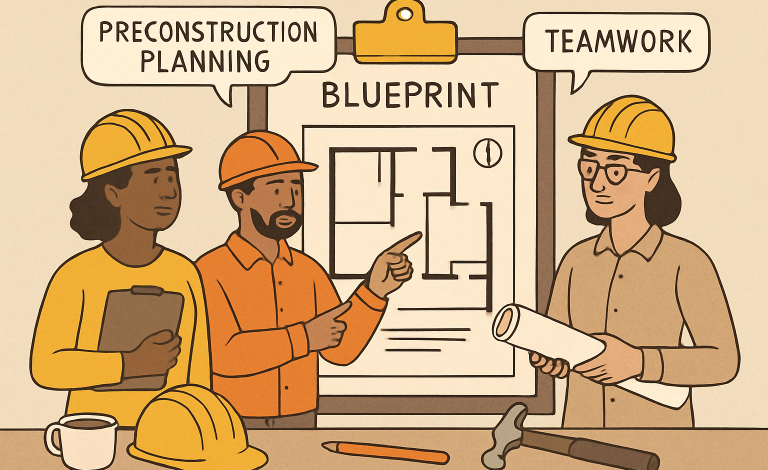How Preconstruction Services Improve Project Outcomes

Successful construction projects begin long before ground is broken. A thorough and proactive preconstruction process lays the critical foundation for streamlined delivery, increased profitability, and greater satisfaction for all parties involved. By engaging commercial contractors Denver early in the development process, project owners can unlock a range of advantages—from more reliable cost estimates to more intelligent risk management and enhanced schedule control. These factors collectively shape the outcome of a project and can determine whether it exceeds, meets, or falls short of expectations. In today’s competitive market, utilizing preconstruction services is not just about getting a head start; it’s about ensuring that every decision is informed, strategic, and tailored to the project’s unique demands.
Leveraging expert preconstruction services can also help ensure alignment between vision, budget, and schedule, while uncovering opportunities to optimize resources and improve collaboration among stakeholders. When every element is thoughtfully planned from the outset, costly rework and miscommunications are significantly reduced. With today’s increasingly complex construction landscape, where project requirements, budgets, and timelines can shift rapidly, laying the right groundwork is no longer optional—it is essential for project success. The value of preconstruction is reflected in both tangible savings and the long-term functionality and appeal of the finished structure.
Enhanced Cost Accuracy
Building accurately to budget is a chief concern on any project. Preconstruction services enable more precise cost estimations by creating in-depth budgets and scope reviews prior to work commencing. These estimations rely on detailed quantity takeoffs, market analysis, and historical data that provide a granular view of potential costs. Improved early-stage planning leads to fewer budget overruns, enabling project owners to allocate funds confidently and make informed, data-driven choices regarding material selection, labor, and technology. Having effective cost control early on also means there is a lower chance of needing to cut corners later, which can reduce overall risk for both owners and contractors. This precision not only safeguards against unpleasant financial surprises but also contributes to establishing more substantial profit margins from the outset, empowering teams to maximize project value at every stage.
Proactive Risk Mitigation
The risk landscape for construction projects is vast, encompassing scope changes, site conditions, and supply chain issues. Each of these risks has the potential to cause significant delays, budget overruns, or quality concerns if not identified and managed early. A disciplined preconstruction process proactively identifies these risks, allowing project teams to develop contingency strategies and resolve conflicts before they evolve into major disruptions. Implementing tools like constructability reviews and design peer checks can reduce change orders and minimize costly delays. Additionally, effective risk management during preconstruction enables the securing of better insurance terms and enhances stakeholder confidence in the project’s success.
Improved Project Scheduling
On-time delivery hinges on systematic scheduling that takes into account every project phase. During preconstruction, detailed schedules are developed that outline each critical path activity, its interdependencies, and milestones. Preconstruction planning establishes realistic timelines, identifies potential scheduling bottlenecks, and outlines milestones that synchronize the efforts of all trades and suppliers. Advanced scheduling software, such as Building Information Modeling (BIM), enables the visualization of the entire construction sequence, allowing teams to simulate the build and forecast possible challenges. This proactive approach to scheduling helps ensure that equipment, labor, and materials arrive precisely when needed. This planning not only boosts productivity but also helps maintain momentum throughout the build, reducing idle time and ultimately saving money. When everyone is aware of the plan and understands how their contributions fit within it, timelines become more predictable and achievable.
See also: Mastering the Billing Workflow Process for Better Business Outcomes
Optimized Resource Allocation
Resource efficiency has a direct impact on a project’s profitability and sustainability. Preconstruction processes sharpen resource allocation by thoroughly analyzing labor needs, coordinating procurement, and evaluating just-in-time material delivery. Such planning reveals opportunities to source materials from reliable suppliers, minimize redundant labor, and select equipment that best aligns with project requirements. This targeted approach drastically cuts waste, mitigates supply shortages, and ensures that skilled trades are available at precisely the right time. Optimized resource allocation means staying on budget and on schedule—two pillars of successful project outcomes. In addition, thoughtful resource planning contributes to safer jobsites, as resources are matched to needs without overcrowding or downtime, creating an environment that supports quality craftsmanship and efficient progress.
Leveraging Technology in Preconstruction
Innovation in construction technology is transforming how projects are planned and executed. Incorporating platforms such as BIM, 3D modeling, and real-time analytics during preconstruction empowers teams to model complex systems, test construction logistics, and identify costly clashes before they occur. Digital platforms can host centralized project data, facilitate instant collaboration among team members, and provide actionable insights through data visualization and trend analysis. Technology tools create visual roadmaps, aid in decision-making, and foster transparency across all project phases. Utilizing technology in preconstruction enhances efficiency and accuracy, making it easier to communicate ideas and resolve issues.
Fostering Collaboration Among Stakeholders
Early coordination across project stakeholders is vital for discovering innovative solutions, preventing disputes, and aligning all parties to project goals. Preconstruction services often champion integrated delivery models that promote open communication, collective problem-solving, and shared accountability among owners, designers, engineers, and builders. Such strategic stakeholder engagement cultivates trust and a shared vision, leading to more creative and practical solutions that address goals and priorities before significant commitments are made. This collaborative mindset is at the core of the Integrated Project Delivery (IPD) approach, which research shows consistently delivers better project outcomes and higher client satisfaction rates. The more invested each stakeholder is in the preconstruction process, the smoother the execution becomes, resulting in a more cohesive and resilient project team.
Integrating Sustainability from the Start
Sustainable construction no longer begins at the materials procurement stage—it starts in the preconstruction phase. Early engagement enables project teams to evaluate eco-friendly materials, energy-efficient systems, and green building certifications as part of the core planning process. When sustainability is considered from the outset, it becomes easier to incorporate strategies such as passive solar design, water-saving technologies, and responsible material sourcing, which yield significant energy and cost savings over a building’s lifespan. This forward-thinking approach can significantly reduce the project’s carbon footprint, lower operational costs, and enhance a building’s value and public perception. Sustainable decision-making at the outset is now a best practice for projects seeking long-term viability and regulatory compliance, giving forward-looking organizations a competitive edge in both project delivery and reputation.
Conclusion
Comprehensive preconstruction services are indispensable for guiding projects smoothly from concept to completion. By sharpening cost accuracy, mitigating risk, optimizing schedules and resources, leveraging leading-edge technology, and fostering proactive collaboration and sustainability, stakeholders position themselves for successful project delivery. Organizations that prioritize rigorous preconstruction planning consistently achieve higher-quality builds, fewer surprises, and improved return on investment, ultimately elevating the standard for the entire construction industry. For owners, developers, and builders determined to realize the full potential of their construction initiatives, investing in robust preconstruction services is a proven path to superior outcomes and lasting value.




